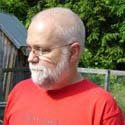Oh, man, you are getting ahead of me here. I've been working on an article. I have, however, just read 50 & 51 again & want to say a little about the notion of correspondence. First, autobiographically, my own work as a poet comes out of a Romantic-Symbolist-Modernist tradition that believes in Correspondence. Especially Yeats, with his elaborate symbolist mythology (which, interestingly, began to drop away--or at least drop out of the poetry--as he became an old man. Age makes materialists of us all.) Nevertheless, there is a great comfort in the belief that our words correspond to actual real things in the world in a direct & meaningful way; there is further comfort in the belief that our words & images & metaphors correspond to some higher "Platonic" world of Forms. Wittgenstein, of course, is the hardnosed Austrian disciplinarian who shatters our dreams of easy sense-making. He takes us to task. My best understanding of these remarks is that the prefigure & even to some extent outdistance the analytical rigor of Deconstruction. My best understanding of what Wittgenstein is trying to convince us of is that there is no meaning inherent in a word, no direct object-word relation upon which we can rely; that there is use within a particular situation / language game. Meaning is always contextual & always human.
I can see that you are about to go on to discuss the practice of philosophy. In light of the above, let me say something about the practice of poetry. Of all the Romantics, Blake (chronologically the earliest) is the most radical. Blake refuses to accept the dualism of real / imaginary. "Everything that is possible to be believed is an image of the truth." Well, I believe in the raccoon who raided the garbage last night & I believe in the existence of a gal named Barbry Allen, though the evidence for my beliefs in the two cases is a little different: spilled garbage v. a ballad in a book. But both of these seem ontologically equal to me, in light of Blake's formulation. I have to deal with both. I believe in God the same way I believe in Barbry Allen or spilled garbage--I have to deal with him. Blake wants to erase the ontological difference between heaven & earth, heaven & hell. It is a mistake to read Blake as ethereal or "mad." I'm moving onto shakier ground here, but I think I'd argue that Blake wants to force us to deal with things from close to. In any case, Blake was the poet who broke me free as an adolescent from traditional metaphysics. It is what allowed me to accept the "lie" that Plato bans: the lie of the poets about reality. Politically, the lie is anti-authoritarian because it demands the freedom of the human imagination. Now it may seem like a long leap from Wittgenstein to Blake, but I see them as both on the same side of the question. Blake calls "from close to" Hell in The Marriage of Heaven & Hell, in which Hell is a far more interesting & energetic place. It is a place in which one can have conversation, not merely receive revelations or the law. It is a place where the meaning of a word comes from its use. Blake took great care with the production of his books, attributing his technique to the technologies of Hell. But each version of his books is different, each is a particular case of color & form & so meaning.

Suburban meditations: I've spent a fair amount of time this summer working on Carole's & my 2/3 acre on the Raquette. Yesterday I took some big flat native stones--granite? schist? Metamorphic in any case--& laid them in a bed of sand at the foot of our front stairs. Came out nicely, I think. Also this summer I have been watching some of the home design shows on the cable channels & what I realized about my own work on my own small place is that I compose my yard the way I compose a poem. I am interested in the ideas of the designers, but I am not interested in their programmatic approach to landscape. I am delighted to discover particular techniques, but I want this knowledge so as to order my patch of earth the way I would order a poem: Okay, if I put the stones here, I will need to bring in fill to level the ground there. Oh, & that tree will have to come down, but I can use its trunk as fenceposts over there. Meaning emerges from feeling one's way, not by following a program. I cook the same way, but that's a different story. (Have to admit I also watch cooking shows on cable.)
Philosophical Investigations
Christopher Robinson & Joseph Duemer read Wittgenstein's Philosophical Investigations


0 Comments:
Post a Comment
<< Home